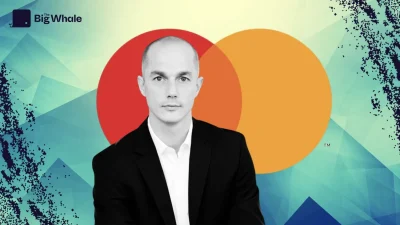The Big Whale: Before we talk about Trump's election , let's talk about you. You were one of the first Europeans to move to New York for crypto. Why?
I started my career in mergers and acquisitions just after the 2008 subprime crisis. I worked at several big banks in London and, at the time, I was interested in cryptos, but it was when I arrived in New York in 2017 that I switched to the subject full-time. This was just before the ICO boom.
At the time, crypto really didn't mean much. In New York, there were a few companies like Circle and Consensus, but overall there wasn't much, and above all there were no crypto VC funds. This is actually why ICOs were born and exploded: the first crypto projects were not financed by VCs, but by individuals.
Why did you choose New York rather than Miami to launch your fund?
Thomas: I could have launched BlockTower's VC fund in Miami, but my job is to be in contact with entrepreneurs. There are a lot of crypto asset managers who have moved to Miami - Jake from Coinfund, Nick Carter from Castle Island, Shan Aggarwal from Coinbase - but the start-ups haven't moved that much.
As an investor, I have to manage both our investors and also be in contact with the start-ups, and the start-ups are all here or passing through here.
TBW: Let's talk about your fund, how is it doing?
We raised $150 million at the end of 2021 and to date we've deployed around 40% of the fund. We were cautious in 2022 when valuations were high, then more active last year with investments in Ethena, Morpho , Maple and Centrifuge.
We invest tickets between $500,000 and several million dollars, with a global team and venture partners strategically positioned in Asia and Europe.
You've just announced a merger of sorts with Arca. Why have you done this? Were you in difficulties? There's strength in numbers?
Arca is a very good digital asset manager and it makes sense to merge our businesses to grow in an environment that's going to be increasingly competitive.
Speaking of competition, we're seeing more and more major players setting up shop in New York. What's changed?
Yes it's true, whether it's funds like Variant, Archetype or companies like Coinbase or Aptos, they've all opened offices here. I think that New York is now the only city in the world where you find such a density of projects.
How did New York become the crypto capital of the United States?
After COVID, many thought that New York was going to be totally left behind by Miami, Austin or San Francisco. But the ecosystem came back here very quickly for 3 reasons:
Firstly because New York is the world's financial capital along with Wall Street.
Then because it's the second-largest VC ecosystem in the US after San Francisco, and even number one in crypto and fintech.
Finally, because there's a unique density of entrepreneurs and investors. In an early stage business where human contact is crucial, this is a decisive advantage.
The corollary of this is that life in New York is extremely expensive...
Yes, everything is very expensive, housing, everyday life. But that's almost an advantage because here, you either succeed or you fail. That's the principle of the American model and it's even more exacerbated in New York.
This "move fast" culture contrasts enormously with Europe, where there's much less pressure on people. In the US, if you don't deliver, you're going to be shown the door pretty quickly.
What are the current trends on the crypto scene in New York?
There are two main trends with projects that could be called "consumer", often based on collections of NFTs, and those that touch on financial infrastructures and tokenisation.
What are your main investment theses?
At BlockTower, we take a different approach to many crypto VCs. While some focus on "liquid" projects, i.e. ones in which they will quickly be able to resell, we look for companies that will still be around in 5 years' time.
In crypto, there is often an obsession with novelty, but we intentionally turn down deals that might work well in the short term if they don't fit with our long-term vision.
One of our beliefs, for example, is that the next generation of crypto unicorns won't be traditional SaaS companies like we've seen for 20 years, but rather companies that own their technology and financial stack, with AI as a key enabler.
This is particularly relevant for crypto since most of the successful projects in our universe have essentially been financial services companies.
What specific themes are you focusing on?
We have been very active in the RWA (Real World Assets) thesis, focusing more on market participants than issuance protocols.
We are interested in credit default swaps, insurance practices, KYC and secondary market companies. From that point of view, the arrival of BlackRock was a huge change.
The other theme I really like is the one concerning stablecoins. A year ago, stablecoins were just trading instruments, but now we see companies making hundreds of millions of monthly payment volumes via debit cards and money transfers.
Do you have any concrete examples of these trends?
A great example of this trend is the start-up Blackbird, founded by the team behind Resy, the restaurant booking platform acquired by Amex.
Blackbird is a restaurant platform that uses blockchain without users realising it. When you go to a restaurant, you scan a code and earn "fly tokens" like loyalty points, which you can spend at any Blackbird restaurant.
It's what we call a Web3 Trojan horse, i.e. with a crypto infrastructure, but a very smooth Web2 user experience.
We've also invested in TYB, which does a bit of the same thing with brands like Nike or Estée Lauder. TYB is a platform that helps them gamify customer engagement.
When customers complete missions like posting on social networks with specific hashtags, they earn tokens - which are actually ERC20 tokens on the Avalanche blockchain.
What are the differences between the US and Europe in Web3?
There are many, but one of the main ones is the cultural difference. Americans are taught from an early age to think bigger. It's like the difference between a European sports match and an NBA basketball game at Madison Square Garden - everything here is more spectacular, more ambitious, in fact there aren't too many limits. The concept of "it's not possible" doesn't exist.
Speaking of things that seemed impossible: Donald Trump finally won by a wide margin an election that seemed, at least from a European perspective, a foregone conclusion for Kamala Harris. What impact will this have on New York and the United States?
It's obviously a major event and we've seen it in recent weeks with the surge in share prices. We still don't know in concrete terms what Trump is going to put in place , but his arrival is changing everything.
We didn't necessarily realise it from Europe, but the constraints on the sector have been quite strong. The SEC really scared a lot of projects, so much so that we saw Democrats in crypto start to think they might vote Trump, and I'm talking about people in New York, which is a historically Democratic city.
Since Trump's election, we've felt a real craze, a real acceleration on the part of traditional finance players. Are you seeing the same thing?
The convergence was already at work, but it's true that things are speeding up. We are seeing more and more projects led by BlackRock, Franklin Templeton, Fidelity and for considerable sums. Nothing will ever be the same again.








